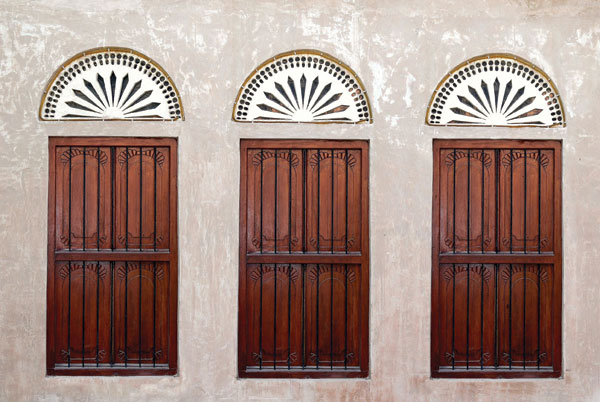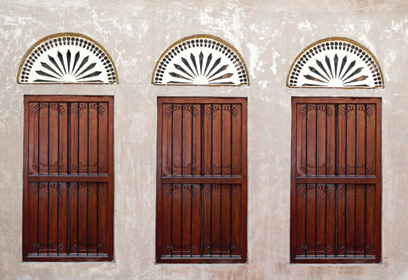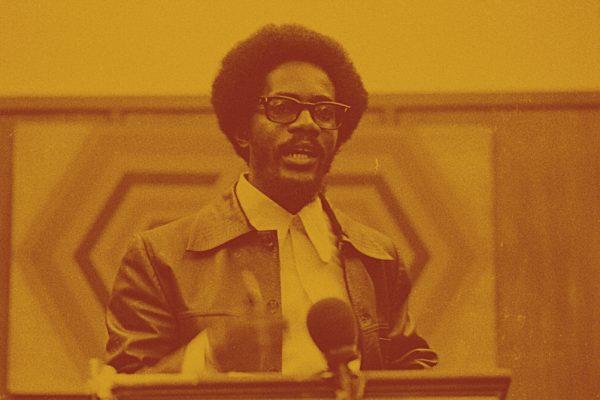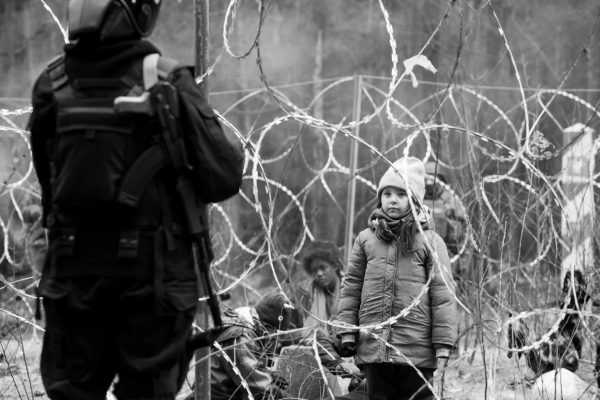
Aziza keeps all the files in her bedroom: expired passports, citizenship applications, letters from neighbors testifying to how long her family had lived in Ras al Khaimah. “It’s all proof,” she says, “so that when you write about us, people will know it’s not from your own mind.”
Aziza’s file records her family’s attempts to become citizens of the United Arab Emirates. For fifty years they have been writing letters, filing paperwork, petitioning officials, trying to make the right connections—and still, most of her family does not have citizenship. The experience is not unique. There is a class of people, in the U.A.E. and throughout the Arabian Peninsula, who have no nationality. They are called bidoun—Arabic for “without.”
Most bidoun were nomads in the territory of the U.A.E. or immigrated to it before 1971, when the Emirates became a formal state with borders and citizenship laws. Many immigrants, especially those who came from the hinterlands of Iran and Pakistan, never had national documentation to begin with. Others destroyed their passports en route, believing they could become citizens of the Emirates only if they held no foreign citizenship.
Today more than 100,000 stateless people live in the U.A.E., according to Refugees International and the Emirates Centre for Human Rights. In an oil-rich country famous for giving its citizens everything, the bidoun are citizens of nowhere, with little hope of being naturalized.
Aziza’s mother and at least half of her eight siblings still live in this limbo, non-citizens of the Emirates yet confined to its borders. They are barred from the free education, health care, and housing allowances Emirati citizens receive as state benefits. Finding employment is also difficult because non-nationals need work permits in order to fill many jobs outside of government and domestic service, yet, legally, permits are only available to passport holders. And routine bureaucratic procedures—getting birth certificates, renewing driver’s licenses—are complicated and growing harder by the day. The bidoun lack the means to advocate for themselves. Speaking to the media about their plight or organizing to demand citizenship can get them detained or deported. Last summer U.A.E. authorities exiled the writer and activist Ahmed Abdul Khaleq to Thailand for his online campaign for the stateless.
• • •
Less than a quarter of the roughly nine million people who live in the Emirates are citizens. The rest are expatriates from almost every corner of the globe, ranging from wealthy businessmen to low-wage construction workers and housemaids.
Along with rising immigration has come rising exclusion, which has a long history in the Emirates and throughout the Arabian Peninsula.
For millennia Arab tribes populated the land that would become the seven emirates. Some of the tribes were nomadic, while others concentrated in cities. Because the territory lay at the nexus of trade routes between Europe and Asia, the British and Portuguese vied for control of it until the British prevailed in the early 1800s. Under this arrangement, a handful of coastal tribes accrued social and economic influence, and the British came to regard the heads of those tribes—the sheikhs—as political rulers.
In a rich country famous for giving its citizens everything, the bidoun are citizens of nowhere.
As the tribes became embedded in international commerce and diplomacy, their domains developed into more defined political entities. When the British wanted unrestricted
maritime access in the Persian Gulf, they sought it from the sheikhs, to whom they also looked for protection from Emirati pirate attacks. Separate truces were negotiated with each sheikh, who agreed to reject alliances with other foreign powers and limit sea access to the British. Because of these truces, the emirates came to be called, collectively, the Trucial States. The more permanent effect was the creation of the seven emirates as distinct political units. Once-porous borders took on greater solidity as the link between power and territory strengthened.
The link between power and ordinary people, however, was fraying. Rulers formerly accessible to the people grew further removed, a process exacerbated by the discovery of oil in the 1950s. Abu Dhabi, the largest of the emirates, first exported crude oil in 1962, and the influx of revenue funded all the trappings of a modern state: hospitals, highways, schools, and other infrastructure projects.
The emirates remained separate entities until 1968, when the British announced plans to vacate the Gulf. Sheikh Zayed, then ruler of Abu Dhabi and later president of the U.A.E., initiated the union of the emirates. Six of them—Abu Dhabi, Dubai, Umm al-Quwain, Sharjah, Fujairah, and Ajman—formed an absolute-presidential monarchy in December 1971, and Ras al Khaimah joined the following year.
Among the first orders of business in the young country was the creation of a system of citizenship. In 1972 the government drafted Federal Law Number 17, “Concerning Nationality, Passports, and Amendments Thereof.” The law stipulated that anyone who had lived in the area that became the U.A.E. since 1925—that is, for at least forty-seven years—could become a citizen. This posed a significant barrier to naturalization. Most residents had arrived between 1960 and 1970, when the population of the U.A.E. more than doubled from 90,000 to 223,000.
Two articles in the U.A.E.’s 1972 citizenship law did hold out the possibility of gaining citizenship. Those who had lived “legally and continuously” in the Emirates since at least 1940 could wait an additional twenty years and become citizens in 1992. Other criteria included proficiency in Arabic, a reliable source of living, and no criminal record. The law established that citizenship would pass from father to child, and foreign wives could become citizens after a three-year waiting period and upon renunciation of their original nationality.
Meanwhile, immigrants continued to pour in. A large portion of them came from rural provinces in Iran, Pakistan, and the semi-autonomous area of Baluchistan, fleeing poverty or tribal wars. A smaller portion, including Aziza’s family, came from East Asia. The greatest influx came in the decade following federation, from 1970 to 1980. The population quintupled from about 230,000 to more than a million as migrants from Iran, India, and other parts of South Asia flooded into the ports of Abu Dhabi and Dubai in search of jobs in a booming oil economy. The Iranian Revolution in 1979 and subsequent Iran-Iraq War brought thousands more immigrants from across the Gulf, and a Pakistani government crackdown on separatist movements in Baluchistan compelled more Baluchis to flee to the Emirates. Unlike foreign laborers, immigrants who escaped political turmoil sought permanent residence.
• • •
Records from the period immediately after federation are sparse, but oral accounts point to a haphazard registration process, with a clear disparity between urban and nomadic Emiratis. The latter generally failed to register for a number of reasons: illiteracy, unfamiliarity with the idea of documented citizenship, or lack of identifying paperwork. As a result many Arab nomads shared the same fate as new immigrants.
During an interview in Dubai, Sayed Mohammed Sayed Muni, a retired municipal administrator, told me that many immigrant bidoun had destroyed their passports before or upon arrival—if they had them to begin with. They believed in error that if they had no proof of citizenship from elsewhere, they would gain it in the U.A.E. The outcome was inconsistent. “Some got U.A.E. nationality, some did not,” he said.
Stateless residents who managed to register might receive identification cards indicating they had no nationality. These residents could work in the police force, military, or other public sector jobs and could obtain medical services. Aziza’s relatives also spoke of a stateless card, but they received theirs more recently, in 2008. Aziza’s brother Mohammed told me, “That card is useless—it does not have any value because we cannot use it. It doesn’t mean anything.” Mohammed and his sister Maryam, both bidoun, say the card is merely a way of identifying them as stateless residents for the purposes of tabulation. For them, it has nothing to do with naturalization or free access to services available to citizens.
Borders now exist where there were none before.
In the 1980s the U.A.E. ceased processing citizenship applications from new immigrants. Other Gulf Arab countries did similarly, enacting restrictive laws with the apparent goal of keeping a homogeneous citizenry. These laws prevented Emirati bidoun from moving elsewhere on the Arabian Peninsula to get citizenship, since borders now existed where there were none before. Without passports, bidoun could not even return to their places of origin.
“By that point,” Muni said, “it was too late.”
• • •
Like many bidoun, Aziza’s father Abdul came to the U.A.E. after winding through several countries of the Middle East, where he hunted for citizenship along the way.
He was born in Burma to an Iraqi father and a Burmese mother. His grandfather had made a sizeable fortune as a trader in the prosperous early 1900s. But Abdul’s fortunes soured when anti-Muslim riots broke out in the late 1930s, forcing him to flee with his mother along with thousands of others. At the time of the pogroms, Abdul held a British-endorsed Burmese passport. He settled in Kuwait—not yet an independent country—for four years, until a fire destroyed much of the city where he lived, including his home. Only his passport survived.
After the fire, Abdul and his mother moved to Saudi Arabia. He took a job at the Saudi interior ministry, screening citizenship applications for fraudulent paperwork. The minister of immigration, Ahmad al Kurdi, promised Abdul Saudi citizenship if he worked eight years for the government.
Abdul and his mother marked the passage of each year with a pilgrimage to Mecca by foot. Abdul would tie his mother on his back with a rope and carry her through the mountains and across the desert. They lived on dates and water and slept on the sand beneath the stars.
The eighth year in Saudi Arabia came and went. Abdul requested citizenship, but the interior ministry—his own office—denied him. Instead he was issued a provisional document making him a legal resident of the country, but not a citizen. Aziza says her father began fighting with the immigration office for his citizenship, but the only response was an offer of passage to Qatar, Dubai, or back to Kuwait. In 1955 Abdul and his mother packed up their lives for the third time and traveled to Dubai.
Abdul’s Burmese passport expired in 1956, and because there was no Burmese consulate on the Arabian Peninsula, he had no way to renew it. In 1958 Abdul, his mother, and his new wife settled permanently in Ras al Khaimah. His days of wandering were over; from that day forward, his descendants would be born and die in the Emirates.
• • •
“I have been living in Ras al Khaimah for eighteen years,” the letter began. It was written in a child’s steady, self-conscious script. “There are witnesses who can testify to this.” Aziza remembers writing this letter for her father when she was in the third grade; Abdul’s Arabic was too poor. It was 1973, one year after Ras al Khaimah joined the Emirates and the country enacted its citizenship law. The language of the letter suggests Abdul was unaware of the law’s stipulations.
He made every effort to procure birth certificates for each of his ten children. Aziza was the oldest. She says her childhood was consumed with caring for the younger children and doing housework with her grandmother while her parents worked to make ends meet.
Abdul had found a job at the national water and electricity ministry, and he befriended one of the sheikhs in Ras al Khaimah—Sheikh Mubarak, Aziza says. The sheikh promised to get citizenship for Abdul’s family, so he gave the sheikh copies of all his documents and waited two years before hearing from him. When he finally inquired about his citizenship status, Sheikh Mubarak told him all his paperwork had been lost.
In 1980 and 1981, Abdul tried again. He had a friend draft another letter citing a neighbor who could attest to Abdul’s long-term residence in Ras al Khaimah. He took the letter to the emirate’s immigration office, where he was told he needed to live there for another twelve years. The office promised to transfer Abdul’s file to the capital in Abu Dhabi, where he could reapply when that time came.
Abdul made his last attempt to register in Abu Dhabi in 1996, fifteen years later. Officials told him his paperwork had never made it out of storage in Ras al Khaimah. He was seventy-seven years old.
• • •
Despite their difficulty in gaining citizenship, many of Abdul’s children now speak of the early period of statehood as one of general toleration. Because they had birth certificates, they could attend school, and at least Abdul’s sons made it through all twelve grades. Right before she completed her final exams, Aziza married Mansur, a Pakistani, against her father’s wishes. He had pleaded with Aziza to marry an Emirati citizen.
“He said ‘if you marry a local, your life will be okay,’” she remembers. “But what can I do?” Aziza and Mansur moved to Abu Dhabi “to run away from all the problems,” she said.
Aziza’s marriage ended in divorce after nine years. Through Mansur, she had obtained Pakistani nationality, and they had three children. After the divorce, she moved back to Ras al Khaimah with her children and worked low-wage jobs at a factory and a carpet-cleaning company before taking a job as a jailer. She made her own attempts to get Emirati citizenship after the divorce since she had no ties to Pakistan, but she was denied every time. Her children all had Pakistani passports, which allowed them to attend school.
Some of Aziza’s siblings fared better than others. One brother, Rami, applied for a scholarship in the United States and left the country. The family knows little about how successful Rami was abroad or where he is now, and they rarely speak to or about him. Another brother was killed in a car accident driving a truck from Dubai to Ras al Khaimah. His widow is bidoun, and her five children cannot attend Emirati public school because they do not have birth certificates. She lives with Aziza’s mother, and the family supports her. Two of the sisters, Najla and Maryam, married Emirati citizens but still have not been naturalized. Aziz, the oldest brother, enjoyed the most fortune, landing a high-paying job as the manager of a real estate company in Dubai. He married a woman from Bangladesh and owns two spacious homes in Ras al Khaimah. He still holds no nationality.
Mohammed has taken over his father’s efforts to naturalize the family. He remembers driving to a consulate in Abu Dhabi a few years ago to inquire about the family’s status and learning they had finally fulfilled the residency requirement. But when the application was forwarded to a committee for formal approval, it was denied. “They say we are from Burma, and need to get a Burmese passport,” he said. “But there is no Burmese consulate. It’s an excuse.”
Another brother, Jalil, who has a penchant for run-ins with the law, fought the committee’s decision. He returned again and to the immigration office in Ras al Khaimah, where he would yell at the officials, including the minister of immigration. Jalil was imprisoned repeatedly for his belligerence, jeopardizing the family’s standing with immigration officials.
In 2010, at ninety-one years old, Abdul died without citizenship.
• • •
In 2006, under the growing scrutiny of Human Rights Watch, Amnesty International, Emirates Center for Human Rights, and other organizations, the government began to address the stateless residents. According to a U.S. diplomatic cable that was leaked in 2011, U.A.E. President Sheikh Khalifa ordered that the situation needed a solution “once and for all.” The National, a state-owned newspaper, reported shortly afterward that 1,294 bidoun had been approved for naturalization, but “they were generally dealt with on a case-by-case basis.”
In 2008 the Emirates formed a committee to compile data on the bidoun and recommend solutions for them. The government estimated their number at around 10,000, a tenth of the likely figure. (There is no category for bidoun on the country’s census reports, which document only “nationals” and “non-nationals.”) Later that year, the government opened a sixty-day registration period for bidoun. They were told to bring their paperwork to immigration centers, where they waited in hours-long lines to submit their files. After the sixty-day period closed, unregistered bidoun would risk prosecution.
The National reported that nearly 8,000 applications were submitted on the first day of registration. Registration centers ran out of paper applications, and the total number of applicants was never reported. According to the U.S. Department of State’s Bureau of Democracy, Human Rights, and Labor, the Emirates government naturalized fifty-one bidoun in 2008, seventy in 2009, none in 2010, and none in 2011, the most recent year for which data are available.
Those who were not naturalized received new instructions. The government decided the bidoun needed legal status before they could become naturalized. In order to become legal residents, bidoun were told they had to apply for passports from the Comoros Islands, a small archipelago off the east coast of Africa. They had three months to comply, or they would be designated illegal aliens and risk detention. After the bidoun became Comorian citizens, they were told they could be reconsidered as candidates for naturalization. The Emirates had purchased these passports from the Comoros for $200 million, according to Al Jazeera and Le Monde.
A U.A.E. official told Mohammed that if he took citizenship from the Comoros Islands, his family’s file would be reevaluated to make sure that the applicants met “all their terms,” and then they would be naturalized as Emiratis. He does not know what those terms are. “It’s not in our hands,” Mohammed said of the opaque process. “What they are doing, actually, is not giving a choice. We have to take it, otherwise they won’t look at our papers.”
Reactions to the Comorian citizenship directive varied among the bidoun and within Aziza’s family. Her brother Aziz praised the move as a step forward for the stateless: “It means that the government has a good plan,” he said, “that they’re still thinking about us, we still have a place in their hearts. They did not forget us.” Aziz, who lives more comfortably than most non-citizens, believes the Emirati government has been nothing but charitable to the bidoun. He does not tolerate criticism of the state. During our conservation, he pulled a book off his shelf that commemorated the public works of Sheikh Zayed, the first and longtime president of the country, and spent the rest of our interview explaining its contents. Mohammed and Maryam also speak of government charity and hesitate to criticize the country, but both were frustrated by the order to take Comorian passports.
Many bidoun are now prevented from renewing their driver’s licenses, getting birth and marriage certificates, and attending public schools.
Jalil refused to file. “I am fighting with my government,” he said. “I will not keep quiet.” He likened the deal between the U.A.E. and the Comoros Islands to slavery: bidoun citizenship was being bought and sold. When I met Jalil, he was carrying two copies of the Universal Declaration of Human Rights—one in English and one in Arabic—which states, “Everyone has the right to a nationality. No one shall be arbitrarily deprived of his nationality nor deprived the right to change his nationality.” Jalil vowed to reject the Comorian passport and traveled to Abu Dhabi to wrestle with the capital’s immigration office again.
The Comorian passport arrangement puzzled even some members of the royal family. Sheikh Ahmed Juma al Makhtoum, brother-in-law to the ruler of Dubai, expressed his displeasure during an interview in Ras al Khaimah. “I myself don’t like it,” he said. “But at least it’s something. And the government, really, is a little bit too hard on them,” he added. The deal also met opposition in the Comoros Islands. When the idea was first proposed in 2008, Comorian Vice President Ibrahim Mohamed Sidi stood before the parliament and criticized the government’s “greed” and willingness “to sell Comorian citizenship to countries from the Gulf who want to free themselves of families that had become an encumbrance.”
There are no data on how many stateless residents now hold Comorian passports. Interviews I conducted in Ras al Khaimah’s Baluchi village suggest that most residents there had filed the necessary paperwork for Comorian citizenship. In July 2012 the National reported from this village, “There are no bidoun here.”
And life seems to have grown harder for bidoun since the Arab Spring. The U.A.E. did not experience uprisings or violent government crackdowns, but many bidoun are now prevented from renewing their driver’s licenses, getting birth and marriage certificates, and attending public schools. Maryam told me that some of the schools in Ras al Khaimah started enforcing a “no bidoun” policy and would no longer enroll children without passports. “They are making it so we can’t live here,” she said. (Schools I inquired with denied discriminating.) As wives of Emirati citizens, both Maryam and her sister Najla are qualified by law to be naturalized, but both were told they needed to apply for Comoros passports first, just like all other bidoun.
• • •
Since the summer of 2012—when Ahmed Abdul Khaleq was arrested and deported to Thailand in response to his online campaign for the rights of the stateless—there has been little news of the bidoun. Human rights organizations condemned Khaleq’s deportation and pressed for his release, but coverage of the bidoun has fallen off sharply since his exile. Only a few media outlets reported on the Comoros deal. The U.A.E. keeps a tight grip on its stateless, and by all outward appearances, activism has ceased there.
Mona Kareem, who advocates for bidoun across the Arab Gulf, said her work in the U.A.E. has been stymied by fear. Even documenting how many bidoun are in the Emirates is a major challenge, she told me, because many of them refuse to share basic facts such as their names and places of birth. They worry that giving out such information could jeopardize their already-precarious situation. Recording their experiences is out of the question.
Aziza’s family voiced similar concerns, warning that the government, sensitive to any stirring of bidoun demands, might confiscate my laptop and notebooks. Maryam thought that more openness could be good for bidoun, but Aziza was less hopeful. She said that without a country, she has no future. That her father’s story—or even hers—would be told seemed beside the point.
“They will see only what you write,” she told me, “but not how I live.”
Photograph: Ebraheim Al Samahi / 123RF








